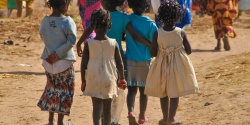Published: 08.04.2020

The 53rd session of the UN Commission on Population and Development was to take place at the turn of March and April. The event was cancelled due to the coronavirus pandemic. The proposed final document of the session includes postulates for ensuring ‘reproductive and sexual rights’ and implementing depopulation concepts. According to the authors of the draft act, the implementation of these objectives is supposed to be a way of combating malnutrition in the world. At the same time, they ignore the fact of food waste and the problems of its distribution.
In theory, the aim of the population conferences and sessions of the Commission on Population and Development is to improve the world's humanitarian situation. This session was supposed to be devoted to problems related to nutrition and food distribution. In reality, however, the draft document contains depopulationist postulates, also related to the promotion of birth control.
The proposed act makes little reference to the problem of malnutrition and hunger in Africa. Its main message is a controversial assumption that natural resources are shrinking and population is growing, which supposedly is the reason why hunger still prevails in the world. One of the excerpts from the draft document directly indicates that the key to fighting malnutrition in the world is to promote ‘sexual and reproductive health and rights’ (par. 19). All of this to have fewer children born and, consequently, fewer people to feed. At the same time, the authors of the act do not notice that, according to estimates, about 1.3 billion tons of food is wasted every year. They also ignore numerous voices of experts pointing out that the main problem is not the lack of food, but difficulties with its distribution and accessibility.
The Commission on Population and Development is one of the eight commissions of the UN Economic and Social Council. It has been operating since 1946, and since 1994 its main task is to monitor the implementation of the Programme of Action of the International Conference on Population and Development in Cairo. This conference is the reason why the concept of ‘reproductive rights’ has entered the official international discourse. Ultimately, due to opposition from many countries, the conceptual scope of this term has been largely limited (although it is still controversial). It was also made clear that abortion cannot be seen as one of the methods of family planning, and countries are obliged to prevent it.
“The UN bodies associated with population and development have been promoting neo-Malthusian ideas for decades. Population growth - that is the birth of new children - has been shown as a problem and a threat to global security. Therefore, instead of focusing on solving humanity’s most pressing problems, they promote depopulation and birth control, to be achieved through the so-called reproductive and sexual rights. Therefore, the fact that such postulates were included in a document on the problems related to the fight against malnutrition is not surprising,” said Karolina Pawłowska, Director of the Center of International Law of Ordo Iuris Institute.

12.05.2025
In a significant development for Poland’s conservative movement, the newly established Stańczyk Club in Warsaw hosted its first Coalition Meeting last Friday. This event marks the introduction of a model of center-right collaboration that has been influential in the United States since the early 1990s.

During Holy Week, when we remembered the martyrdom of Jesus, many Poles heard about the innocent death of 9-month-old Felek (such an altered name was given to him by Gazeta Wyborcza journalists). Potassium chloride – a substance used to carry out death sentences – was injected into the heart of the boy who was due to be born any day.

• Gazeta Wyborcza published an article titled "Ordo Iuris Wants the Constitutional Court to Delete the Premise of Endangering a Woman’s Health. Prof.

17.04.2025
• The Ordo Iuris Institute has prepared an opinion for the UN as part of a thematic report on surrogacy and its impact on the rights of women and children.